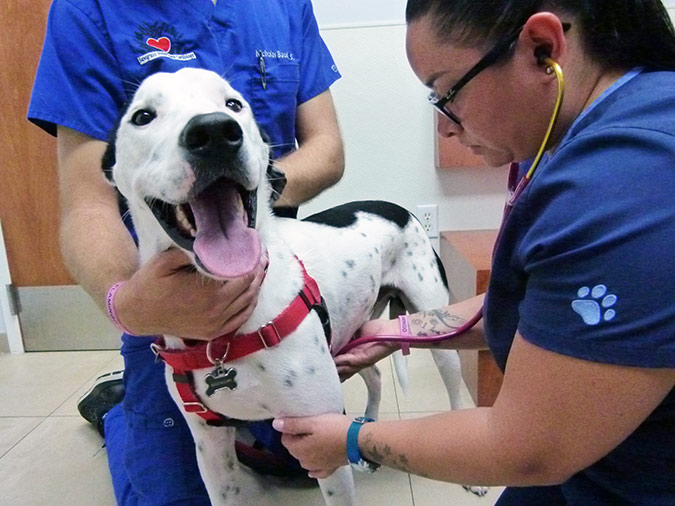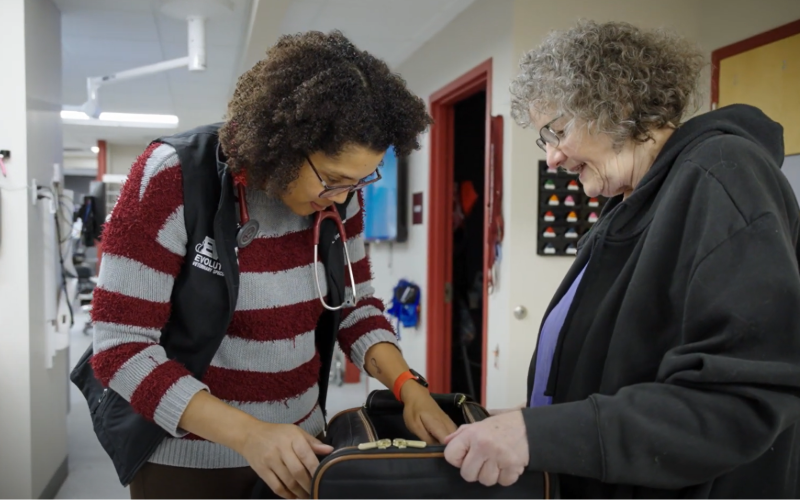Exploring the Crucial Providers Provided by a Vet Cardiologist: Understanding Ultrasound and CT Check Strategies
Veterinary cardiologists play an essential role in the health and wellness of pet dogs by detecting and dealing with various heart problems. They make use of advanced imaging strategies, such as cardiac ultrasound and CT scans, to offer exact examinations. Each technique has its unique advantages and applications. Recognizing these techniques is crucial for animal proprietors seeking the most effective care for their buddies. What factors should pet dog owners consider when picking in between these diagnostic tools?

The Function of Veterinary Cardiologists in Animal Healthcare
Vet cardiologists play a vital function in the health care of pets, concentrating particularly on identifying and treating heart-related conditions. They have specialized training that permits them to interpret complex diagnostic examinations and recognize various cardio issues. These specialists utilize innovative techniques, such as echocardiography and electrocardiography, to examine heart function and framework accurately.Veterinary cardiologists also develop tailored treatment strategies that might include medicines, way of life adjustments, and, in many cases, surgical interventions. Their knowledge encompasses enlightening animal owners concerning heart health, emphasizing the importance of normal examinations and early detection of potential issues. Partnership with general vets is important, as it assures comprehensive look after family pets with presumed heart issues. By supplying specialized services, vet cardiologists considerably enhance the top quality of life for pet dogs and provide satisfaction for their proprietors, strengthening the relevance of heart wellness in general pet health.
Common Heart Concerns in Animals
Usual heart issues in pets can substantially influence their health and lifestyle. Heart whisperings, various types of cardiomyopathy, and congenital heart defects are among the most widespread conditions that veterinarians come across. CT Scans For Animals. Understanding these problems is essential for pet owners to guarantee prompt medical diagnosis and proper therapy
Heart Murmurs in Pets
Although heart whisperings can be a source of concern for animal owners, they are not constantly a measure of major health concerns. A heart whispering is an irregular audio generated by rough blood flow within the heart. In pet dogs, these murmurs can be brought on by various elements, consisting of congenital heart defects, shutoff problems, or also anxiety during examinations. Numerous pet dogs with heart whisperings lead normal lives without significant health and wellness impacts. To determine the underlying reason, vet cardiologists commonly utilize analysis strategies such as echocardiograms and Doppler ultrasounds. Early discovery and analysis are necessary, as they may assist handle any kind of potential cardiac issues properly. Pet dog owners are urged to consult their veterinarian for a detailed analysis if a heart murmur is discovered.
Cardiomyopathy Kind Explained
Cardiomyopathy incorporates a group of conditions affecting the heart muscle mass, causing endangered cardiac function in animals. One of the most usual kinds include dilated cardiomyopathy (DCM), hypertrophic cardiomyopathy (HCM), and restrictive cardiomyopathy (RCM) DCM mainly impacts dogs, triggering the heart to expand and weaken, which diminishes its capacity to pump blood successfully. On the other hand, HCM is a lot more common in cats, defined by the thickening of the heart walls, frequently leading to blocked blood flow. RCM, though less common, takes place when the heart muscular tissue ends up being inflexible, restricting its ability to loaded with blood. Each kind provides unique challenges in diagnosis and therapy, demanding specialized veterinary cardiological assessment to ensure peak administration and treatment for influenced pets.
Hereditary Heart Issues
Hereditary heart problems represent a substantial category of heart problems in pet dogs, distinctive from obtained conditions such as cardiomyopathy - CT Scans For Dogs. These problems are architectural problems existing at birth, affecting the heart's regular function. Usual kinds consist of patent ductus arteriosus, ventricular septal issues, and pulmonic stenosis. Signs and symptoms might differ widely, ranging from light to severe, and can consist of exercise intolerance, coughing, and problem breathing. Early diagnosis via sophisticated imaging techniques like ultrasound is vital for reliable monitoring. Vet cardiologists play an important role in recognizing these conditions and recommending suitable treatment options, which may consist of medical administration or medical intervention. Recognizing congenital heart problems enables far better end results and improved high quality of life for affected pet dogs
Recognizing Cardiac Ultrasound: Just How It Works
A substantial number of veterinary practices currently make use of cardiac ultrasound as a necessary diagnostic tool for examining heart health in animals. This non-invasive method makes use of high-frequency acoustic waves to create pictures of the heart's structure and function. During the procedure, a veterinary technician applies a gel to the animal's upper body and uses a transducer to discharge ultrasound waves. These waves bounce off the heart and surrounding structures, creating real-time images on a monitor.Veterinarians can evaluate different facets of cardiac health and wellness, consisting of chamber size, wall surface movement, and shutoff feature. Additionally, cardiac ultrasound permits the discovery of problems such as fluid build-up and genetic heart defects. This method is essential for detecting conditions that might not show up with typical radiographs. By giving thorough info about the heart's makeup and performance, cardiac ultrasound help in developing reliable treatment prepare for animals dealing with heart problem.
The Significance of CT Checks in Diagnosing Heart Conditions
How do CT scans boost the diagnosis of heart disease in veterinary medicine? CT scans supply comprehensive cross-sectional photos of the heart and bordering frameworks, allowing veterinarians to imagine intricate physiological connections. This imaging strategy is especially useful in identifying hereditary heart problems, heart growths, and problems in capillary. By using sophisticated imaging formulas, CT scans can assess heart chamber sizes and function, offering a complete view that may be tough to attain with conventional methods.Additionally, CT angiography can picture blood flow and determine locations of constriction or blockage, which is necessary for preparing prospective interventions. The speed and accuracy of CT scans also help with fast diagnoses, vital in emergency situation situations. Eventually, the consolidation of CT scans into vet cardiology significantly improves the precision of diagnoses, making it possible for targeted treatment strategies and improving person outcomes for animals dealing with heart disease.
Comparing Ultrasound and CT Scan Strategies
While both ultrasound and CT scans are invaluable devices in vet cardiology, they supply unique benefits and constraints that influence their use in detecting heart disease. Ultrasound, or echocardiography, gives real-time imaging of the heart's structure and function, allowing vets to analyze heart chambers, valves, and blood circulation. It is particularly efficient for assessing problems like heart disease and cardiomyopathy. Ultrasound might be restricted in imagining particular anatomical frameworks due to patient size or obesity.In comparison, CT scans deal comprehensive cross-sectional pictures of the heart and bordering tissues, making them optimal for determining architectural irregularities, growths, or vascular issues. Although CT scans supply complete insights, they need sedation and might include radiation exposure. Eventually, the choice in between ultrasound and CT checks depends on the particular scientific scenario, the individual's problem, and the info needed for a precise diagnosis.
Therapy Alternatives Offered With Veterinary Cardiology
Veterinary cardiology offers a variety of therapy options customized to attend to numerous heart conditions in animals. Treatment strategies usually start with way of living modifications, including diet regimen modifications and exercise modifications, focused on enhancing general heart health and wellness. Medicines play a vital role, with cardiologists recommending drugs such as diuretics, beta-blockers, and ACE preventions to improve and manage signs and symptoms cardiac function.In more serious cases, interventional treatments, such as balloon valvuloplasty or stent placement, might be required to reduce blockages or enhance blood circulation. For sure genetic heart issues, surgical alternatives may be explored to remedy architectural problems. In addition, recurring surveillance and follow-up care are necessary components of an extensive treatment plan, enabling for prompt changes based on the pet's response to therapy. On the whole, vet cardiology concentrates on providing effective, customized care to maximize the wellness and well-being of animal people with heart conditions.
Exactly how to Prepare Your Animal for a Cardiac Evaluation
Preparing a pet dog for a cardiac assessment is vital to guarantee accurate outcomes and a smooth process. Owners ought to first schedule the appointment with the veterinary cardiologist and discuss any kind of details needs or problems. It is a good idea to withhold food for a minimum of 12 hours before the examination, as this assists improve imaging high quality during procedures like ultrasound or CT scans.Additionally, keeping a tranquil setting on the day of the appointment can help lower the pet dog's anxiousness. It is valuable to bring along any type of relevant clinical records, consisting of previous tests and medications (Ultrasound For Dogs). Owners ought to also ensure that their pet is comfy and leashed during transportation to the center. Familiarizing themselves with the analysis procedure can aid and find minimize worries in asking notified inquiries during the appointment. By complying with these actions, owners can add significantly to the effectiveness of the cardiac analysis
Regularly Asked Inquiries
The length of time Does a Heart Ultrasound or CT Check Take?
The duration of a heart ultrasound commonly varies from 30 to 60 minutes, while a CT scan might take about 15 to 30 mins. Factors such as the individual's problem can influence these time best site quotes.

Are There Any Dangers Related To These Analysis Treatments?

Can I Remain With My Animal During the Treatment?
The vet center's plan commonly determines whether animal owners can continue to be throughout procedures. While some clinics urge proprietor presence for convenience, others might require splitting up to ensure security and perfect problems for analysis imaging.
How Much Do These Analysis Tests Commonly Expense?
The expenses of analysis examinations, such as ultrasound and CT scans, generally differ based on area and facility. Typically, rates range from a couple of hundred to over a thousand dollars, mirroring the complexity and modern technology included.
What Is the Recovery Refine After a Cardiac Examination?
The recovery procedure after a heart assessment involves keeping track of the pet dog for any type of prompt reactions, making certain comfort, and restricting exercise. Vets generally give post-evaluation instructions to assist pet proprietors throughout this vital recovery period. Heart whisperings, various kinds of cardiomyopathy, and hereditary heart problems are amongst the most widespread conditions that veterinarians run into. A heart murmur is an irregular audio produced by rough blood circulation within the heart. Cardiomyopathy incorporates a group of diseases impacting the heart muscle mass, leading to endangered cardiac function in family pets. Genetic heart defects represent a considerable group of heart issues in animals, unique from gotten problems such as cardiomyopathy. Ultrasound, or navigate to this site echocardiography, provides real-time imaging of the heart's structure and function, enabling veterinarians to examine heart chambers, shutoffs, and blood circulation.